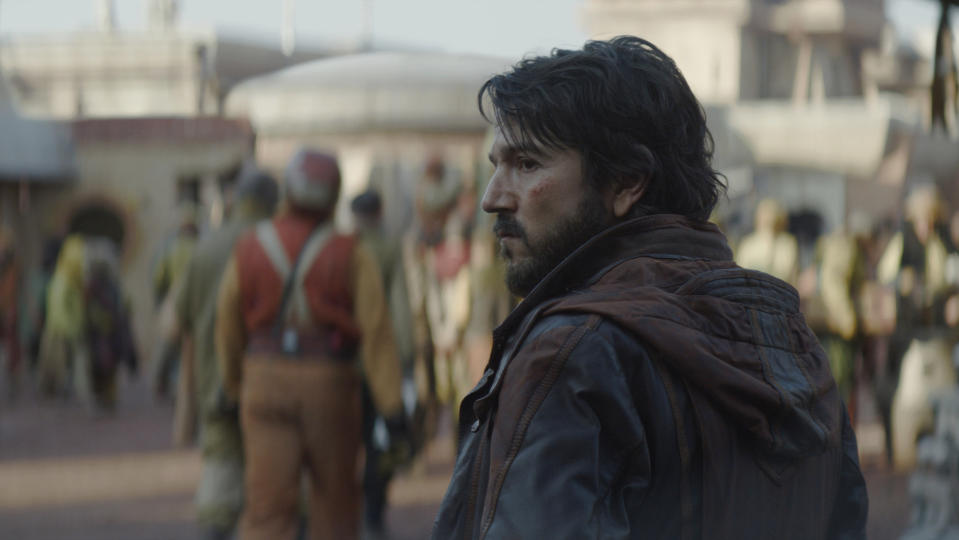Composer Nicholas Britell Deserves Emmys for Both ‘Succession’ and ‘Andor’

It’s Nicholas Britell versus Nicholas Britell in the Emmys race for the “Succession” (Max) and “Andor” (Disney+) original scores — and the Emmy-winning composer is also competing for the “Andor” theme as well. Not surprisingly, he’s favored to take home wins for both “Succession” and “Andor” in the respective categories. Which is only fitting since this is his last chance at the big musical “Succession” prize after being denied the first three seasons, and his unconventional theme for the critically acclaimed “Rogue One” prequel is a standout.
For score, Britell is up against HBO’s “The Last of Us” (Gustavo Santaolalla) and “The White Lotus” (Cristobal Tapia de Veer), and Netflix’s “Wednesday” (Danny Elfman and Chris Bacon). For main title, he’s up against “Guillermo del Toro’s Cabinet of Curiosities” (Netflix, Holly Amber Church), “Ms. Marvel” (Disney+, Laura Karpman), “The Lord of the Rings: The Rings of Power” (Prime, Howard Shore), and “Wednesday” (Elfman).
More from IndieWire
'The Gilded Age' Season 2 Teaser: Carrie Coon Starts a Social War in 19th Century New York
Sam Levinson Teases 'Euphoria' Season 3 as a 'Film Noir' with Rue in a 'Corrupt World'

‘Succession’
Britell’s first foray into TV, with Jesse Armstrong’s satirical comedy-drama about the dysfunctional Roy family and its global media empire, allowed him to experiment with 18th-century classical music, hip-hop, and 808 drum beats.
“I think there’s something really dark that the show was exploring and satirizing at the same time,” Britell told IndieWire in Season 1. “Getting darker makes it funny, and that’s what I leaned into — this counterpoint.”
This culminates in Season 4 with the early passing of Logan (Brian Cox) in the nominated “Connor’s Wedding” episode, which results in the chaotic aftermath and total loss of control for siblings Kendall (Jeremy Strong), Roman (Kieran Culkin) and Shiv (Sarah Snook) as they scramble to hold onto their empire. The score becomes even more layered in its emotional richness and comic absurdity.
However, Britell’s musical pathos is most apparent in the long sequence in which the siblings attempt to say their goodbyes to their father over the phone. Indeed, “Phone Call” functions as a Requiem Mass with its dominant, melancholy organ.
“To me, the key for that sequence in particular was that we had to feel like we were inside that emotion,” the composer told NPR. “I didn’t want to push people to feel a certain way, I wanted it to feel like you were actually one of them, feeling this, feeling your father dying on the phone and you can’t be there.”
‘Andor’
Britell got to be musically experimental with the “Star Wars” universe in “Andor.” Created by Tony Gilroy (who co-wrote “Rogue One”), we find out how Diego Luna’s Cassian Andor went from a world-weary scavenger to a cunning Rebel spy. Beyond the franchise’s sci-fi trappings, though, Gilroy made a gritty spy thriller that focused heavily on the complacency of the authoritarian Empire and the nascent rebellion’s ability to fly under their radar. Britell was able to lean into the dark vibe that reflects Cassian’s personal rage against the Empire, formed with the aid of a pulse motif. At the same time, the composer also tapped into his growing commitment to join the rebellion through a combination of synths and symphonic elements. He even created a very strategic on-camera musical sound of a bell ringer devised as a warning system on Ferrix.
Much of this factors into the main theme, along with the foreshadowing of the amateur band on Ferrix that performs at Maarva’s (Fiona Shaw) funeral in the composer’s nominated “Rix Road” season finale. What’s unusual was that each episode contains a different version of the theme, indicative of Cassian’s and the show’s complexity and changing arcs after every three episodes.
The centerpiece of the “Rix Road” finale is the slow-building Ferrix uprising against the Empire, of which Britell’s funeral march is key. It begins with the townspeople slowly gathering and playing the piece in tribute to Maarva. The horn-centric piece is divided into three parts, emphasized by low brass, trumpet, flutes, and French horn. The final part segues into a swirling flute melody tied to Maarva. At the funeral, a hologram of Maarva implores the town to rise up and “Fight the Empire!” and a riot ensues. It serves as the final catalyst for Cassian to join the rebel alliance.
“It was very important to Tony that we get this really, really right,” Britell told IndieWire. “What would it feel like to have a piece of music that resonated through the ages?”
Best of IndieWire
Where to Watch This Week's New Movies, from 'Blue Beetle' to 'The Adults'
The 50 Best Sexy Movies of the 21st Century, from 'Spring Breakers' to 'X'
Sign up for Indiewire's Newsletter. For the latest news, follow us on Facebook, Twitter, and Instagram.
